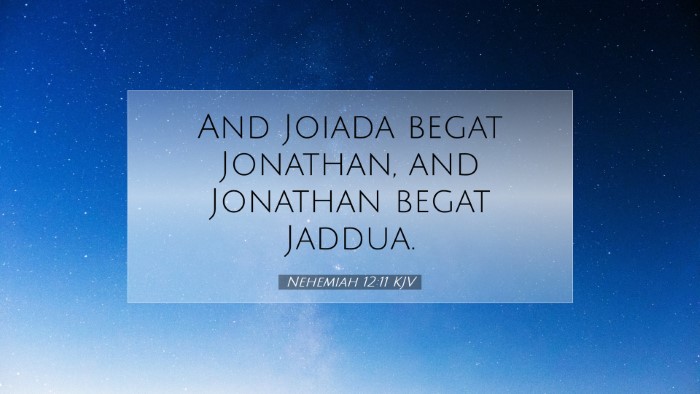Commentary on Nehemiah 12:11
Nehemiah 12:11 states: "And Joiada begat Jonathan, and Jonathan begat Jaddua." This seemingly simple genealogy holds significant theological and historical implications that can deepen our understanding of the priestly lineage and the continuity of God's redemptive work among His people.
Historical Context
The verse is part of the post-exilic community that rose after the Babylonian captivity, as chronicled in the book of Nehemiah. This genealogy emphasizes the importance of priestly families in Israel's restoration and worship practice.
- Restoration of Worship: Following their return, the Jews faced the task of re-establishing their religious practices, which were pivotal to their identity.
- Continuity of the Priesthood: This lineage underscores the faithfulness of God in preserving the priesthood—a vital aspect of Israel’s covenant relationship.
Exegesis of the Verse
This section highlights significant elements from public domain commentaries:
-
Matthew Henry:
Henry emphasizes that genealogies serve a purpose in establishing authority. By tracing the priestly line, the text acknowledges the legitimacy of the priesthood that serves the people and God.
-
Albert Barnes:
Barnes points out that names in genealogies often carry meanings or signify roles within the community. The careful recording of generations reflects the value placed on heritage and God's promises through lineage.
-
Adam Clarke:
Clarke expands on the importance of the priestly lines during the second temple period, noting that this verse illuminates the transition from the former priesthood to a renewed sense of identity and purpose after exile.
Theological Implications
The implications of Nehemiah 12:11 resonate through various theological themes:
-
God's Faithfulness:
This verse reflects God's unwavering commitment to His covenant people through successive generations, signified by the priestly line.
-
Identity and Community:
The genealogical importance underlines community identity, reminding believers today of their collective history and spiritual heritage in Christ.
-
Sovereignty in History:
The precision in recorded names highlights God’s sovereignty in orchestrating history, showing His active involvement in human affairs for redemptive purposes.
Applications for Ministry
Pastors and ministry leaders can draw several practical applications from this text:
- Emphasizing Heritage: Teaching about the importance of heritage in the faith can encourage congregants to appreciate their spiritual roots and legacy.
- God's Continuity: Just as the Lord preserved the priestly line, He is active and present in the church today, assuring believers of His plans through generations.
- Community Building: Highlighting the value of collective identity can foster a sense of belonging and commitment within the church community.
Conclusion
Nehemiah 12:11, while seemingly a brief record, serves as a rich tapestry of God’s faithfulness, the importance of heritage, and the divine orchestration of history. As believers reflect upon these truths, they are reminded of their place within the ongoing story of God's work among His people.


